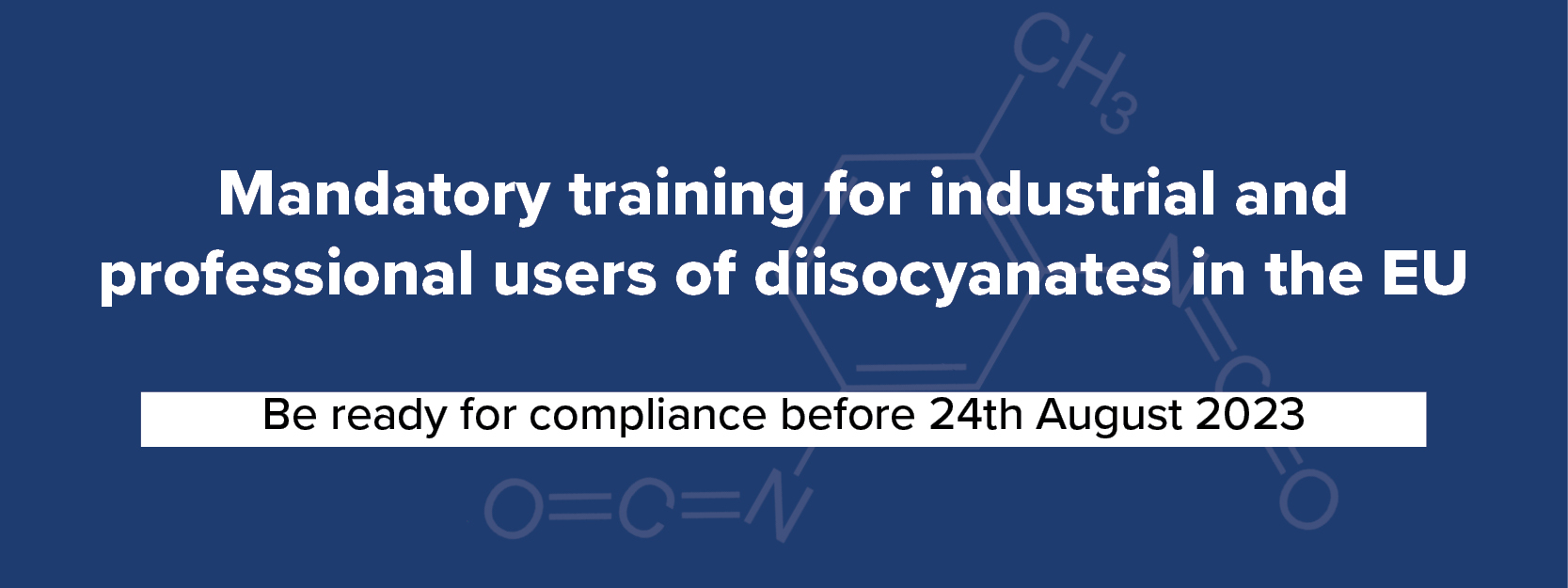Safety training diisocyanates

Safety is #1 at Filoform and the CRH group
On this page you will find all the information you need to timely inform and certify your employees for working safely with Filoform polyurethane synthetic resins.

Why is the training mandatory?
In Europe there are many industries that work with diisocyanates where the exposure to free isocyanate is sometimes too high. If not handled properly, diisocyanates can lead to irreversible hypersensitivity. The risk of exposure is extremely low when using Filoform's products, but that does not alter the fact that there is a risk of exposure if used carelessly. Workplace behavior is key to safe use of diisocyanates.
To address the potential risk, the EU REACH regulation is introducing mandatory training to help workers understand the risks and how to minimize exposure to isocyanates.
REACH is a regulation of the European Union, adopted to improve the protection of human health and the environment from risks that can be posed by chemicals, while enhancing the competitiveness of the EU chemicals industry. On 4 August 2020, a new restriction on diisocyanates was published in the Official Journal of the European Union. It targets respiratory and dermal sensitisation potentially caused by diisocyanates and requires training prior to use.
Who is responsible for training the workers who work with diisocyanates?
It is the employer's responsibility to ensure that its employees are properly trained. They must be able to demonstrate, at the request of a competent authority, that their personnel are qualified. Unskilled workers will no longer be allowed to use these products as of August 24, 2023.
What training should be followed?
The European Diisocyante & Polyol Producers Association (ISOPA) and the European Aliphatic Isocyanates Producer Association (ALIPA) together with industrial partners have developed a training program to train diisocyanate users according to EU guidelines. As of November 1, 2021, they have launched an English-language online training platform. In the course of 2022, all EU languages will be added to the platform. For current information and updates, please visit the website www.safeusediisocyanates.eu.
Depending on the application and the risk of exposure, there are 3 training levels (level 1,2 and 3). The level 3 training is required for industrial use with a high risk of exposure. Only an online training at level 1 is required for the processing of Filoform products.
For whom and for which Filoform products does this apply?
The mandatory training applies to professional users of Filoform's polyurethane synthetic resins. To inform users about the mandatory training, the following sentence has been added to the safety sentences on the Filoform product packaging. The training is mandatory for the products below.
EU restriction: Appropriate training must be completed by August 24, 2023 for industrial or professional use.
- FiloFill P2654 (Cast resin + Cast resin joints)
- FiloFill P2600 (Taped resin injection joints)
- FiloSlim P2662 (FiloSlim Wrap around joints)
- Cabinet Base Sealant
- PUR Resin 2234, 2235, 2236, 2566 (Duct sealing systems type MD1, MD2, MD3, MD4, MD5)
Information about mandatory training:
On the website safeusediisocyanates.eu you will find all information about the mandatory training.
For the processing of Filoform's PU resins, the Training: 048 - Adhesives, Sealants and Foams directly applied out of small packaging at ambient temperature must be achieved.
The training has been developed to make users aware of their behavior when working with diisocyanates. The following topics are covered in the training.
- Explanation of what diisocyanates are.
- Explanation of the effects of sensitization.
- Explanation about working safely and hygienically with diisocyanates.
- Explanation about the disposal of empty packaging and waste.
- What to do in the event of an accident.
Below is an overview of the most important information.
- To be followed online (Web-based).
- Duration of training approx. 30 minutes (Presentation approx. 20 minutes /Test approx. 10 minutes).
- Test with 9 multiple choice questions.
- If the test is not passed, it can be retaken.
- After completion you will receive a certificate.
- Costs: €5,- p.p.
FAQ
What are diisocyanates?
There are multiple types of diisocyanates, the most important of which are: methylene diphenyl diisocyanate (MDI) and toluene diisocyanate (TDI); and hexamethylene diisocyanate (HDI). Together with polyols they form the building blocks of polyurethane. Polyurethane is created by the chemical reaction between diisocyanates and polyols; when these are mixed together a polymer is formed. Polyurethanes would not exist without diisocyanates and polyols.
What are the applications?
Polyurethanes are used for a wide variety of applications to make all kinds of consumer and industrial products. The value chain is very diverse and ranges from applications in the automotive industry to buildings, appliances, mattresses, shoes, adhesives, sealants, etc. Thanks to its versatility and unique properties, the list of applications continues to grow and new, innovative polyurethane products are constantly emerging the market.
Are diisocyanates safe?
Like any substance, diisocyanates’ use is safe when chemicals are handled according to relevant risk management and safety measures. It is also important to stress that virtually no diisocyanates can be found in finished articles. Diisocyanates are only used as reactive chemicals; they react with the polyol to form the PU product and are used up during the reaction.
Is it safe to work with Filoform's synthetic resins?
There are 3 types of exposure that can pose a hazard.
The 1st is oral absorption and the 2nd is through skin contact. With proper processing of the resin and wearing the prescribed personal protective equipment (PPE) and applying general hygiene rules, there is no contact with the resin and the risk of exposure is excluded
The 3rd route of exposure is through inhalation of the dust. To gain more insight into this, Filoform has engaged an independent research agency (TAUW). Measurements have shown that Filoform's synthetic resins can be used safely.
Description of the test (TAW)
To ensure that this test is representative of the most unfavorable working conditions, all work was carried out in a non-ventilated interior space. Samples were taken with a personal air sampler (PAS), where air was taken from the employee's breathing zone over one half-day.
Test conclusion (TAUW)
No diisocyanate has been detected (The detection limit is 0.1 g/m³). The concentration of diisocyanate to which the worker was exposed is thus far below the exposure limit of 20 g/m³. It can therefore be concluded that no risk to the health of the employees is expected when processing the Filoform polyurethane resin. No additional safety precautions are required to avoid inhalation of MDI.
Can you become allergic to diisocyanates?
Yes, this is possible. isocyanates have a sensitizing effect. Sensitization means that a person may become allergic to the substance after repeated exposure. Once the person is sensitized, every time they come into contact with the substance again (even at very low concentrations) they will have an allergic reaction. Repeated skin contact can lead to a skin reaction and repeated inhalation of the substance can lead to respiratory problems (occupational asthma).
Inhalation of the dust is virtually impossible under normal circumstances. During unsealed processing in combination with temperatures above 50ºC, in non-ventilated areas, situations may arise where the exposure limit is exceeded. When using the Filoform polyurethane resins in the prescribed manner, such situations do not occur.
Are there alternatives to polyurethane?
Yes, these include epoxy resins. But the objections associated with the use of epoxy resins in cable joints with regard to the development of an allergy are many times more serious than with polyurethanes.
Will PU sealants and adhesives remain on the market?
The restriction is targeted at avoiding unsafe handling of diisocyanates, not on restricting product availability. Due to their unique properties in many applications PU sealants and adhesives will remain widely available.
I am a reseller/distributor. What do I need to do?
Pass the information you receive from your product supplier on to your customers.
What about PU products for consumer use?
The new regulation only applies to professionals and industry. A separate restriction for consumer use came into force several years ago.
At what date will this regulation come into force?
The new regulation was adopted on 4 August 2020 and came into force on 24 August 2020. So, after a three-year transition phase, by 24 August 2023, all users of PU products should be trained and certified.
Does the supplier (Filoform) need a confirmation from his customer (the recipient of the diisocyanate-containing product)?
No, the supplier must ensure that the professional or industrial customer is provided with information about the training requirements. Whether the customer or user reads that information or even acknowledges receipt of it is not required by the regulation. Furthermore, the supplier must put the following statement on the packaging: ‘As from 24 August 2023, adequate training is required before industrial or professional use.’ A confirmation of receipt from the customer is not required.
How will the training sessions be organised? Does the supplier have to provide the training?
The supplier (Filoform) has to make sure that the training according to the requirements of the restriction is available to the users. Suppliers do not need to organise training sessions themselves. To this end, FEICA, together with ISOPA and ALIPA, the diisocyanate manufacturers’ industry associations, is preparing training material in line with the legal requirements in all the European Union languages. The training material will be made available via an e-learning platform which accommodates online training, webinar sessions or classroom training given by external trainers or organised in-house. While the supplier is responsible for providing his customer with information about the training, the employer is responsible for ensuring that the training is completed by his employees and that this completion is documented.
More questions about diisocyanates?
Please contact our sales department or visit the Safe use of Diisocyanates website: https://www.safeusediisocyanates.eu/what-are-diisocyanates
 Español
Español  Netherlands
Netherlands  English
English  Deutsch
Deutsch  United Kingdom
United Kingdom 

